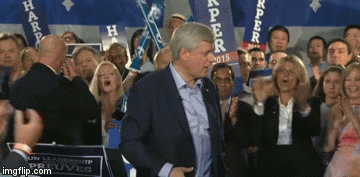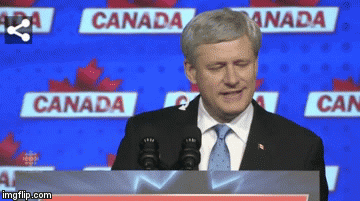
5 things to know about Winnipeg’s big sewage problem
115 billion litres, 70 years to fix, $5.5 billion in lawsuits
Boy oh boy, what a decade! Amiright?
I mean, think about it: back in 2006 when the Conservatives under Stephen Harper hit the political stage with a minority government the world was still all worked up over Brokeback Mountain.
Destiny’s Child was still a thing. So was the anthrax scare.
Needless to say, a lot has happened since those good ol’ bad ol’ days and things are bound to change around here, what with all the “Real Change” that’s being bandied about by our new top dog.
But before we’re off to the Liberal races, let’s take a fun moment to look back at how we laughed and how we cried with Stephen Harper.
Let’s start with a recent one, shall we? The senate scandal.
This particular moment is fresh on Canadians' minds with the much-publicized Duffy trial in August bringing to light just how amuck Harper’s senators were running in Ottawa.
A nice little peek behind the redaction-curtain was offered to all Canadians through Duffy’s kind of hilariously poorly redacted documents. The documents show he was pretty much a Mother Hen-like busy body for the oil industry and anti-environmental attack dog Vivian Krause.
The Duffy affair, which involved a prodigal $90,000 cheque that Harper maintained he knew nothing about, put the PMO in the spotlight and raised pretty damning questions about culpability and who knew what when.
Harper’s right hand man, Nigel Wright, took responsibility for the cheque, becoming just another fall guy in a long list of Harper’s sacrificial lambs.
Overall, however, the senate scandal exposed the culture of corruption and waste embodied in senators Duffy, Patrick Brazeau, Marc Harb and Pamela Wallin who all charged Canadian taxpayers for ineligible living expenses.
A full investigation by the Auditor General found 30 senators were charging the public for things they shouldn’t have and nine of these individuals were referred to the police for further investigation.
The senate scandal tainted the reputation of a government that, back in 2006, campaigned on “cleaning up government.”
Within months of being elected in 2006, Harper introduced the Federal Accountability Act (a watered-down version of his campaign promise) that sought to “begin the process of fixing the system…to clean up government.”
Harper went on to oversee one of the most corrupt senates in Canadian history. Whoops.
On the scandal note, let’s also recall that Harper’s Federal Accountability Act was designed to “ensure that party nomination and leadership races are conducted in a fair, transparent, and democratic manner.”
But remember the freaking robocall scandal!?
In one of the most explicit attacks on democracy in Canadian history, and the most direct attack against actual electors, the Conservative party was accused of using automated and in-person phone calls to confuse the public about where they were supposed to vote. Other calls harassed voters with late-night calls that impersonated opposition parties.
An estimated 690,000 voters were targeted with these calls.
Several investigations were launched that found the calls targeted voters who indicated they were not voting Conservative.
But an Elections Canada investigation found that, even though some of these calls were made from a computer within Conservative party headquarters and that Conservative party staffers were refusing to cooperate with the investigation, there was not enough evidence to pursue full charges against the party.
But don’t worry, there’s a fall guy: while Harper consistently maintained he had no knowledge of the calls, Michel Sona, a twenty-something junior Conservative staffer at the time, was convicted of violating the Elections Canada Act by preventing electors from exercising their right to vote.
Sona was convicted this past August to nine months in prison plus 12 months probation. The judge in Sona’s case concluded the young man did not act alone, but did not rule on any other’s involvement.
In total, the outcome of 13 Conservative seats were called into question. And guess what? The Conservatives in the 2011 election secured their majority by 13 seats.

Perhaps because of the way he ran things (and his penchant for employing ‘fall guys’) Stephen Harper had a lot of enemies.
But no one knew about the existence of a formal list until a leaked internal e-mail prepared for incoming ministers during a cabinet shuffle in 2013 referencing “enemy stakeholders” appeared.
A second leaked e-mail showed the PMO reached out to different ministries asking for suggestions for the blacklist.
A source told the CBC that enemy examples were provided to ministerial aides and they included environmental groups, non-profit organizations and other civic or industry associations that dared to think differently than the Harper government.
Canadians, obviously, were excited about the prospect of being on such an exclusive list.
And although the actual list itself never surfaced, I think it’s safe to speculate now just who ended up on the veritable who’s who of Canadian adversaries: pretty much every environmental organization, First Nations (just, all of them), any person or community or pet against pipelines, organizations fighting poverty (although not, interestingly, people feeding the poor), journalists, organizations fighting for free speech, probably all Muslims but definitely all Muslim women.
You get the idea.
It’s hard to pick a favourite best/worst moment of the Harper government when it comes to pipelines.
But the epic, protracted cross-governmental freak-out that happened around the Enbridge Northern Gateway pipeline hearings should probably take the cake.
About 4,000 individuals signed up to participate in the review process for Northern Gateway, something Harper and his cadre of pipeline cronies took as a personal-affront to democracy.
Then-Minister of Natural Resources Joe Oliver lashed out in one of the strangest acts of statecraft we’ve ever seen: he wrote an open letter to all Canadians telling us all to stop being such goddamn terrorists.
It was awkward. Oh Joe, you old kook. Unfortunately Joe lost his seat in this last election so, I’m sorry to say it Canada, but we may not see those kinds of super fun antics again. Onward and upward, right?
Harper loved himself a prorogued Parliament. That’s because you can pretty much use prorogation to accomplish anything!
In 2008, for example, Harper prorogued (basically, suspended) Parliament to avoid a non-confidence vote.
In 2010 he prorogued Parliament again ‘for the Olympics.’ But this also had the added effect of letting him avoid an inquiry into the mistreatment of Afghan detainees. So neat!
Harper was totes in contempt of Parliament for this, but whatevs!
Harper also shut down Parliament in 2013 to avoid questions about the senate scandal.
In all Harper suspended Parliament for 181 days, setting a new record for prime ministers in Canada.

Last year as countries were gathering Lima, Peru, for the 20th UNFCCC climate talks, Stephen Harper said it would be “crazy” for Canada to regulate emissions from the oil and gas sector.
He added that obviously no one else in their right mind would ever do such a thing (even though it turns out A LOT of people are doing exactly such a thing literally all over the world).
Steve was too busy rockin’ out to care, tho.
The contentious anti-terrorism Bill C-51 is probably Stephen Harper's pièce de résistance. The showpiece legislation showed just how far the former Prime Minister and his voting entourage were willing to pursue a political agenda no matter how many other former prime ministers, national editorial boards, technology experts, legal scholars, civil society organizations, democracy watchdogs and outraged citizens felt it was a really, really bad idea.
Although the bill was supposed to target terrorists, it affected such a grab bag of activities (like being critical of the government, expressing yourself freely, attending protests, disliking pipelines, being indigenous…) it in effect turned everyone and their grandmother into a terrorist.
It was perhaps Stephen Harper's greatest high and greatest low. At the height of his powers, Harper took advantage of the nation's fear in the wake of the Ottawa shooting and carried it to its lowest logical conclusion: you're either with us, or you're with the terrorists. Even our new, fresh-faced leader Justin Trudeau was caught in the shitty binary and, wanting to impress upon the good people his distain for terrorists, voted in favour of what was probably one the worst pieces of legislation in Canadian history.
Harper had a special talent for bending the legislative process to his will. Like Emperor Palpatine, he was a universal antagonist to the end.
Adieu, Harper. Adieu.
Get the inside scoop on The Narwhal’s environment and climate reporting by signing up for our free newsletter. On a warm September evening nearly 15...
Continue reading
115 billion litres, 70 years to fix, $5.5 billion in lawsuits

Climate change, geopolitics and business opportunities power a blue economy

10 billion litres of sewage are dumped into Winnipeg’s lakes and rivers each year. Some...
